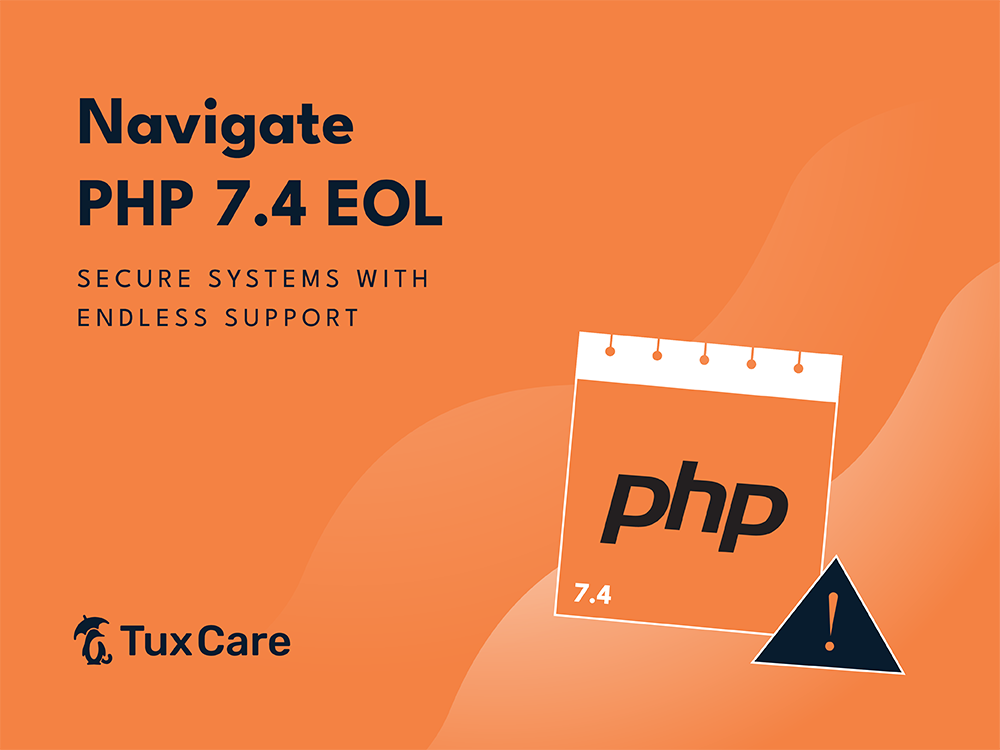Key Takeaways
- After PHP 7.4 EOL, it is difficult to maintain PHP 7.4 applications securely due to the increased risk of security breaches.
- Upgrading to supported PHP versions is recommended for better security, performance improvements, and long-term support. However, migration may require significant code changes.
- If upgrading isn’t feasible, consider Endless Lifecycle Support (ELS) from TuxCare to receive security patches while continuing to run PHP 7.4.
A new PHP branch releases every year, and support for each branch eventually ends — just like it did for PHP 7.4. Once a PHP version reaches end of life (EOL), any security vulnerabilities or bugs found will not be fixed, leaving your PHP applications exposed.
PHP 7.4 reached EOL on November 28, 2022. In this article, we’ll explore the hurdles of maintaining PHP 7.4 post-EOL and offer strategies for risk mitigation and potential upgrade paths.
What Does PHP 7.4 End of Life Mean?
PHP 7.4 EOL means the PHP 7.4 branch has ceased to be supported. That means this PHP version will not receive new bug fixes and security updates. As a result, the applications built on it could no longer be compliant with security and data protection regulations. Therefore, it is crucial to manage and mitigate such kinds of risks and migrate PHP 7.4 applications to newer, supported versions.
Every PHP user is recommended to upgrade to the latest version of PHP, although it is not mandatory. However, after the software reaches the end of life, it becomes difficult to maintain the system securely, as the risk of security breaches increases. The potential legal actions, penalties, and reputational harm caused by data breaches would far outweigh the cost of migration and upgrades.
Risks Associated with Maintaining PHP 7.4 EOL
Running PHP 7.4 after its end of life (EOL) exposes your applications to security threats, compatibility issues, performance slowdowns, and compliance risks.
Risks | Details |
Security Vulnerabilities | Without PHP updates and patches, PHP 7.4 applications are highly vulnerable to emerging security vulnerabilities. Attackers are quick to exploit issues in unsupported software where vulnerabilities remain unaddressed. |
Compatibility Issues | Over time, libraries, frameworks, and third-party services may drop support for PHP 7.4. This can lead to compatibility issues and hinder the functionality of the application. |
Performance Limitations | With no further updates, PHP 7.4 EOL lacks the performance improvements and optimizations introduced in later versions. The applications running PHP 7.4 may suffer from suboptimal performance, which can impact user experience. |
Compliance Concerns | Running unsupported software puts businesses with regulatory requirements at risk for non-compliance. Failing to comply with industry standards can result in penalties and legal repercussions. |
Risk Mitigation Strategies
To mitigate the risks associated with maintaining PHP 7.4 applications after end of life, consider the following options:
Extended Support
Upgrading to newer PHP versions may result in downtime, as there have been lots of deprecations and breaking changes. Therefore, it will require thorough testing and extra costs and time depending on how much your application uses deprecated features.
If upgrading is not feasible at the moment for your production systems, you can consider using extended support for PHP 7.4. TuxCare’s Endless Lifecycle Support for PHP provides essential security updates and patches for end of life PHP versions beyond the official EOL date. This helps ensure your PHP 7.4 EOL applications remain secure and compliant with regulatory requirements while you focus on planning your migration carefully.
Potential Upgrade Paths
The most secure option is to upgrade directly to the latest stable version of PHP (currently PHP 8.4 as of March 2025). PHP 8.4 will be supported until 31 December, 2028. But, this may require major code changes to ensure compatibility so your applications can function seamlessly.
The currently supported versions of PHP are:
- PHP 8.1
- PHP 8.2
- PHP 8.3
- PHP 8.4
Should You Upgrade? Pros & Cons of PHP 8.x
There’s no good reason to delay upgrading. Newer PHP versions improve performance, security, and compatibility. It’s only a matter of time before your PHP 7.4 applications get compromised due to a lack of patches.
However, it is essential to remember that PHP 8 introduced major changes that break backward compatibility with PHP 7.4. This means the code that worked correctly in 7.4 might produce errors or fail to function in PHP 8. Developers need to review and modify their code for compatibility. Additionally, PHP 8 deprecated certain features that were present in 7.4. If your application depends on them, you’ll need to rewrite those sections of code.
Pros:
- Better Performance: PHP 8 supports Just-In-Time Compilation (JIT), which significantly improves performance.
- Security Enhancements: Improved type safety, improved error handling, and nullsafe operator (?->).
- New Features: Attributes, named arguments, match expressions, and additional features.
Cons:
- Compatibility Problems: Older code may need refactoring, which can be costly and time consuming.
- Learning Curve: New syntax and features may require a developer adaptation.
How to Keep PHP 7.4 Secure If Not Upgrading
Upgrading from PHP 7.4 can be a massive undertaking as it may include significant code rewrites. Alternatively, you can opt for TuxCare’s Endless Lifecycle Support (ELS) for long-term support. ELS allows you to maintain your current PHP version securely, receiving critical security patches for as long as needed after the official end-of-life date. This ensures your applications remain protected and operational, freeing you from the pressure of immediate, large-scale upgrades and allowing you to focus on strategic business growth.
TuxCare’s ELS enables you to:
- Receive security fixes for outdated versions of PHP in enterprise Linux distributions, including AlmaLinux, RockyLinux, CentOS and Ubuntu.
- Continue running existing applications without immediate migration.
- Achieve compliance requirements without upgrading.
Secure Your Application with TuxCare After PHP 7.4 EOL!
Maintaining PHP applications after the end of life is a gamble. Although it might function for a while, the security risks and limitations it presents pose a significant threat. Businesses can navigate these challenges effectively with extended support and planning for strategic upgrades.
With TuxCare, you can get ongoing security patches for outdated PHP versions, allowing you to run PHP 7.4 applications safely while planning a smoother transition.
Want to know how much it will cost to secure your workloads running on outdated PHP versions? Get a quote today!
Frequently Asked Questions:
Is PHP 7.4 Still Supported in 2025?
No, official support for PHP 7.4 ended on November 28, 2022. Therefore, continuing to use PHP 7.4 in 2025 exposes your system to vulnerabilities and compliance risks.
How Many Websites Are Still Using PHP 7.4 EOL?
Many websites still run PHP 7.4 due to legacy applications and compatibility concerns. However, running an unsupported version poses significant security risks.
Should I Upgrade from PHP 7.4 to PHP 8.x?
Yes, upgrading ensures better security, performance, and compatibility with modern frameworks. If immediate upgrading isn’t possible, consider TuxCare’s Endless Lifecycle Support for PHP.
How Do I Check If My Website Is Running PHP 7.4?
Run this command in your terminal:
php -v
Alternatively, you can create a PHP file with php phpinfo(); ?> and access it in a browser.
Summary

Navigate PHP 7.4 EOL: Secure Systems with Endless Support
Description
Learn how to navigate challenges of maintaining PHP 7.4 applications after PHP 7.4 EOL. Explore risk mitigation and potential upgrade paths.
Author
Rohan Timalsina
TuxCare
Publisher Logo

💸 Affordable Cloud Servers in Argentina! 🚀
At Full Tech Solutions, we offer Affordable Cloud Servers with high performance and advanced security, perfect for entrepreneurs, businesses, and developers looking for power at a budget-friendly price.
💰 Competitive Pricing: Power and flexibility without breaking the bank.
⚡ High Performance: Speed and stability for your applications.
🔒 Advanced Security: Protect your data with cutting-edge technology.
📞 24/7 Support: Our experts are ready to assist you anytime.
Don’t compromise quality for cost. Choose Full Tech Solutions and get the best affordable cloud servers in Argentina.
🌐 Scale your project with performance and savings!




